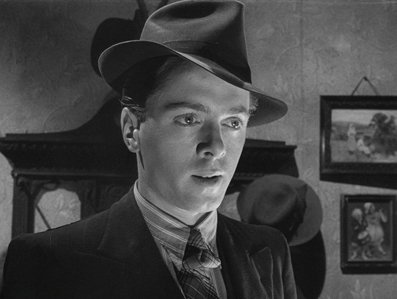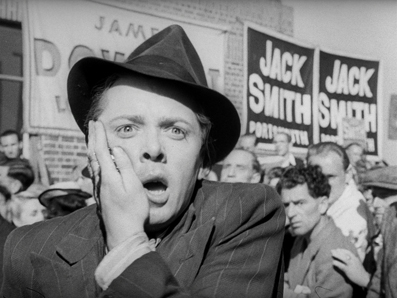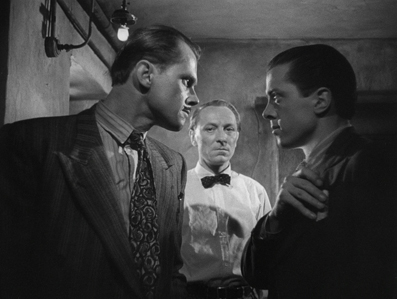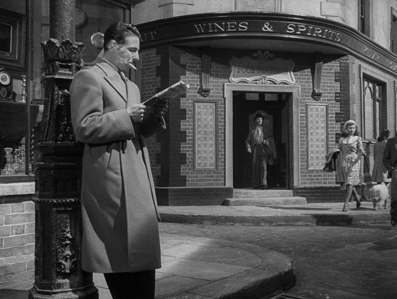| |
"After the film Brighton Rock came out – in which I played the would-be gangster, Pinkie – I experienced celebrity, such as screaming female fans, on a scale I could never have dreamt." |
| |
Actor, Richard 'Dickie' Attenborough, giving more
ammunition to the canard that all girls love a bastard. |
| |
"These atheists don't know nothing. Of course there's a hell." |
| |
Pinkie revealing a guilt complex the size of Brighton Pier. |
What were you at seventeen? Yes, what, not who or where. Confused? Confident? Cocksure? I had the emotional maturity of cheese (almost all of which was still inside the cow), the certainty of a mote of dust taking a metaphysics exam and the same assured, masterful command of romance as demonstrated by Travis Bickle in Taxi Driver. In short, seventeen wasn't a well-fitting cloak over my shoulders. Who is even three-dimensional at that age? I imagine most of us at seventeen were still finding our way. Not Pinkie. He seems to have got lost years ago and thinks he's now on the right road. As seventeen year-olds go, Pinkie isn't so much precocious as preternaturally disposed to violence as an effective method of problem solving. Here's a boy – remember that – a boy who's already had enough hardship and betrayal in his life that he takes murder in his stride. Let's add that he used to harbour ambitions to be a priest. He has so many contradictions that if he were an equation, Stephen Hawking would still be at the digital whiteboard.

Pinkie commits violence with the same tunnel vision and ambition as a committed athlete. He's determined to shape his world the way he needs it to be but he's not old enough to take into account the chaotic effects of causality. As soon as A is tied off with a needless murder (brilliantly staged inside a ghost train ride), B, C and D unravel and so on until what must be a reckoning, a punishment of the damned. This is a movie after all and morality must be maintained however unrealistic it may seem 'in real life'. The moment Pinkie pushes a man to his death, skeletons a-screaming, the sides of his lonely road are walled up – there's only one direction to go and it's downhill all the way. Let's just say St. Peter's not going to answer the gate. The shrill trill of the bell is coming from the floor beneath the floor below. And Pinkie is a Catholic and knows that real fear cruelly and misguidedly instilled in him as a child. Hell, he still is a child. His mortal soul may be forever toast. So why does he sin so cardinally? Thankfully, there's no backstory on offer so his reasons are always his own. It's left to the viewer to decide why this seventeen year-old baby face needs to be a heartless and vicious killer.
Attenborough's performance is nasty enough to warrant any of the gang being sufficiently intimidated by Pinkie – he has that act down pat, that suggestion in his demeanour that in any altercation, the other fellah's going to come off worse. There's that and the adult suits that although well fitting, always look a little loose on Pinkie's graceful slender frame. The fact that this odious little bastard is played by one of the nicest men on the planet is neither here nor there. It's simply fine acting. What Attenborough does with some artful skill (he was twenty-four playing seventeen and totally convincing) is present the hard shell, suggest its brittle nature and then in moments of extreme tension, let the real seventeen year old boy out for a reality check or two. I'm not talking about the perpetual scowl and reluctance of Harry Enfield's screen teenager but when rivals, Colleoni's mob betray Pinkie at the race track (I wonder if that's where Mario Puzo got the name of his most famous creation?), he actually squeals with indignation "It's not me you want, you mug, it's him!"
This telling exchange reveals not only his naiveté (getting rid of Pinkie is not a big deal to the protection racket boss, Colleoni) but also his age and abyss-deep lack of experience. He's the boy crying for his mother at the opening of Saving Private Ryan, the little lad who's still in that protective shell of glinting blade and idiotic bravado. He's almost petulant and that's a good thing, a safety valve of sorts. This is a boy in a man's world and despite the ever-twitching blade hand and the business with the cat's cradle, the boy surfaces with some teenage astonishment every time life doesn't go according to Pinkie Brown's grand plan. There are moments when you feel for Pinkie even though his behaviour is that of a cocksure hoodlum on a mission to make his life and everyone else's lives more difficult at every turn. You keep on saying to the screen "No, mate. That's not going to end well..." He gets enough advice from his gang members, but to maintain discipline he has to be seen going his own way even if that way is palpably wrong.

It's Brighton in between the two world wars updated from Graham Greene's original novel based in the 30s. We are reliably informed by an opening crawl – apparently inserted by the authorities fearing a drop in tourism – that Brighton is now a jolly place but it didn't used to be. The existence of protection rackets prove one thing if nothing else; that the seedier and more violent elements of the criminal fraternity have a real sense of irony. Brighton is awash with an emasculated Police force and a burgeoning crime culture that throws up the unlikeliest hoodlum slash-would-be gangsters. How seventeen year-old Pinkie became the murderous leader of a group of ne'er do wells is a simple case of accession. The movie starts by revealing a gang murder – Pinkie's boss, Kite's. The journalist Fred, whose work led to Kite's murder, has turned up in town (I feared for the man's life very early because supreme idiocy is always punishable in the movies. I'm assuming he knows the Brighton gang will 'do for him' but he turns up anyway. Idiot). On behalf of his newspaper, he's prepared to give away money to those who challenge him (as long as they are carrying the newspaper that's initiated the stunt). I'm just old enough to remember wandering around holiday beaches as a youngster and looking out for the mysterious man shrouded in shadow in the photograph in one of the broadsheets. Even The Sun was a broadsheet then and a real newspaper. Hard to believe, I know. As a sales stunt it must have worked. But attention is not something this reporter wants.
With the superb use of music (courtesy of composer, Hans May) sometimes echoing a classic score to come fifteen years later – Bernard Herrmann's Cape Fear – Fred's rather nasty predicament is effectively heightened. He flees around Brighton – his way to the train station is blocked by a few of the gang – but he is discovered all too quickly by Pinkie and his acolytes attempting to ingratiate himself with some alarmingly witless women who can't sense that he's scared to death. It's a real testament to the film's pace, direction and in particular the performance of Fred (by Alan Wheatley) that you are never in any doubt that he is in real fear for his life. The 'tough' protection racket gang has been a staple of cinema since the invention of 35mm film but for reasons lost to me, these scenes still have great power in this movie. Perhaps it's because the Boulting Brothers' style is sometimes at odds with the subject matter (like shooting mud lovingly) but it's this stylistic approach that lends the film a shelf life and gives it an effectiveness that sixty plus years haven't dimmed. Yes, the Cockney slang will fox most young or non-UK viewers (The Long Good Friday had a slang guide inserted to its opening just to make sure the American audiences could follow it) but there's never any doubt about character intent. Isn't that the key to 'getting' a performance?

There's also the gang's casual take on morality even among themselves. Spicer (Wylie Watson) fears Pinkie and the trouble the gang could get into due to his hot headed reactions. He doesn't want their new boss to learn that the one man seen as responsible for Pinkie's gang leader's demise is in town. He suggests (and I quote) "Let's carve Fred up a bit and then tell Pinkie afterwards..." That's almost as bad as killing the poor bastard, that throwaway violence as an alternative to murder. What does date the film (of course) is the depiction of violence. There are blade slashes, pre-made up wounds to react to and most of the violence is suggested by a brisk editing style but as I have no great desire to see Saw-like visuals in my entertainment (that's a bald faced lie as I am something of a zombie fan), I was happy enough that these scenes still held power. If the actors convince, it's half the battle.
And what a cast Attenborough has to play with. His gang includes the soon to be Doctor Who, William Hartnell, suitably nefarious and menacing. There's Nigel Stock as a spiv on whom I suspect Walker was based in Dad's Army. Of course, I'm most familiar with Stock playing No. 6 in the original Prisoner series while McGoohan was shooting Ice Station Zebra in Hollywood. The blousy amateur detective, Ida, played by Hermione Baddeley is a suitable foil for the murderous Pinkie (less Miss Marple, more Mistress Quickly). She's the audience's viewpoint except perhaps for the music hall sense of humour. But the actor with the most difficult role is Carol Marsh playing Rose. Cursed or blessed with a great memory, she's the key to Pinkie's future in more ways than one. But she has to convince that someone could fall for this alarming brute whose small talk includes the threat of having her face slashed. With their Catholic link (surely it has to take more than that), Marsh manages to maintain her purity, her innocence while gleefully following Pinkie on a road of which she cannot be unmindful. It's the innocence that does it. If she were more aware of her predicament, the performance would be hard to swallow but the high wire act is perfectly judged. And if there are any classic horror fans out there, you'll recognise Marsh as Lucy from the original Hammer Dracula.
Brighton Rock is a genuine classic (having stood the test of time). Its drama, intrigue and characters are still compelling after all these years and as much as I'd like to rattle on about how wonderful the ending is, I'll leave that to you to see for yourself. It's seen as a compromise happy ending but if you stop and think for a minute, it promises far more beyond the end credits. Terrific stuff. I will hand you over to Slarek for what I hope is a glowing report on the state of the Blu-ray...
I always get just a little excited when an older film, particularly one for which I have a great affection, is restored and given a Blu-ray release, so the news that Brighton Rock was receiving such treatment had me twitching in anticipation. Of course, it's easy to build unrealistic hopes here – despite the beauty and resolution of 35mm, everything depends on the condition of the original materials and the extent of the restoration, and the older the film, the greater the restoration work usually required, and the less likely it is that we'll be using the word 'pristine' in our reviews. But despite being made over sixty years ago, Brighton Rock looks rather fabulous here. Yes there is some variance in sharpness and contrast integrity (possibly the result of the restoration being carried out from multiple source print or negative material – unfortunately there is no Masters of Cinema style textual explanation to confirm this), visible grain, some very minor intermittent picture jitter, and there are a more dust spots than I'm used to seeing on a modern digital restoration (though this does vary from scene to scene), but the contrast is punchy without sacrificing picture detail, the level of detail far surpasses any previous home video version, and there's a lovely tonal richness to the best material – of which there is much – that you only seemed to get with monochrome 35mm. This, I'll wager, is as good as the film has looked since its first cinema release.

The mono 2.0 soundtrack shows its age in a narrowed dynamic range (the thunderclaps sound meatier than expected, though), but there's no distortion or damage and – more surprisingly – not a trace of background hiss.
Interview with Rowan Joffe (20:11)
If the name doesn't sound familiar, know that Joffe is the director of the recently released Brighton Rock remake, and whatever your view of that particular update, he's a man who knows and admires the original and is thus well worth listening to. Areas covered include the casting of a young Attenborough, the character of Pinkie, the role played by the Brighton location, the change made to Greene's original ending (which Joffe re-used in the remake) and the watering down of the book's Catholicism.
John Boulting and Richard Attenborough interviewed at the NFT in 1954 (1:07:57)
Before you get too excited at the prospect of a filmed interview with the film's director and leading man, this is an audio only recording accompanied by a loop of production stills from the set of Brighton Rock, but an enthralling one nonetheless. Hosted by Stanley Reed, there's an entertaining intro from Attenborough, who plays sincere tribute to the brothers' professionalism, warns the front three rows about John's habit of cadging cigarettes, and at one point amusingly manages to make the word 'Boulting' sound like a curse word. Boulting himself talks about a number of his films in reference to extracts that we neither see nor hear and is a fine and entertaining storyteller, particularly when responding to barely audible questions from the audience, which Attenborough occasionally expands upon. He praises the then current censor John Trevelyan and amusingly outlines his battles with his predecessor, whom he dismissively describes as an "absolute clot." Boulting's middle-class upbringing does prompt a sniffy attitude to trade unions and a story about being taking to the cinema by his nanny, but he does state that the non-conformist is the really vital element in the community, a point on which I think we can all agree.
Camus has said it all above, and on this undisputed British noir classic we are in complete agreement. I haven't seen Rowan Joffe's remake and I'm not in any hurry to do so. It may well be a serviceable work, but given that the original provides everything I could possibly want from a film version of Greene's compelling novel, I genuinely have no reason to hunt Joffe's unnecessary remake out. A superb film, a fine restoration and transfer, and a couple of worthwhile extras are enough to wholeheartedly recommend this release.
|